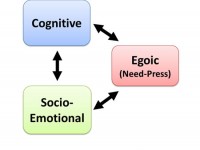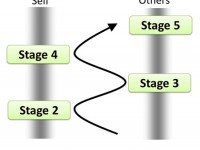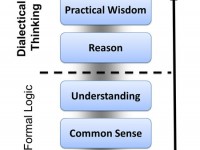In this short video, I present a short introduction to CDF, the Constructive Developmental Framework, to show how its use enables large companies under siege coming from very small and nimble companies to fend off competition. I focus on CDF developed at the Interdevelopmental Institute, as a tool for strengthening talent management and promoting better conversations in teams and throughout the corporate culture. find out more about hte related Course: CDF as a business development tool Read More...
Tag: Team Development
What is the Constructive Developmental Framework?
Otto Laske gives you an overview of the Constructive Developmental Framework CDF and offers a few examples of how it can be used for self-awareness and personal growth. The emphasis in the video is that when we speak and relate to others, we are already embedded in a "frame of reference", and that this frame develops over the entire life span. That means that, in a way, we are sitting in a cave, without our knowing, unless we decide to explore the cave. Read More...
How to develop collaborative intelligence?
One of the new IDM initiatives is a 'Rewiring Team Dynamics' workshop which will be organized as a three day seminar in April 2015, near Brussels/Belgium. The key question is: How can we create groups that can learn from mistakes faster, more efficiently, and more consistently than competitors do?' The background of this question is the simple observation that a lot of groups systematically under-perform. They do not make good decisions and they do not solve complex problems in a collaborative way. Traditional Team Building Traditional team building interventions, which are mainly behaviorally focused, do not seem to work when team members are highly developed (especially when they are knowledge workers). The top interventions advised from a behavioral point of view are: foster constructive debate in meetings push back when consensus forms to quickly use devil's advocate thinking look for competing explanations to challenge your observations get some distance, step away, and then try again in order to recognize and interpret complex data use visual graphs or flowcharts to juxtapose the larger picture with the individual puzzle pieces reframe situations and always examine several more options use impromptu meetings when time is limited to generate more options, including unconventional choices... Read More...
Introduction to Developmental Work with Teams
This course introduces team leaders and team coaches to fundamentally new ways of understanding the nature and behavior of teams, with the goal of re-shaping team dynamics. In the course, two main processes are distinguished: interpersonal and task process. Their balance is thought to define team maturity. The purpose of the course is twofold: to change coaches’ perception of teams based on social-emotional insight, and to give them new, dialectical, dialog tools for supporting team members’ interpersonal process and for strengthening their task process. Team maturity and different modes of team leadership are central course topics. The methodology taught goes far beyond purely the behavioral approaches now used, focusing on team members’ developmentally shaped frame of reference on account of which they collaborate in the team and view the organization they art part of the way they do. Students will be asked to submit a concise description of a team they are working with; their descriptions will provide the focus around which CDF tools are introduced and practiced in class. The study cohort itself will serve as a team to practice on. Read more Read More...
Team Coaching from an Adult-Developmental Perspective
In this course, team leaders and team coaches acquire new competences pertaining to working with teams. Specifically, they learn to experience work with team members from a social-emotional perspective and therefore are able to discern different levels of team maturity. Immersing themselves in different ways of meaning making, they also come to understand that the cognitive level of discourse of a team, that is, complexity and fluidity of the discourse, is a function of team members’ maturity both in *thinking* and *meaning-making*. By sharpening their expertise for intuitive as well as reflective work with teams, participants prepare themselves for functioning at a higher level of leadership than they have so far been able to operate on. The practical highlight of the course is that participants are introduced to dialectical thinking, a form of holistic, systemic, and transformational reading of, and responding to, the real world. Although the practice of dialectical thinking in this course is not as extensive as in the subsequent case study, participants gain a fair foothold in reflecting on how, rather than what, team members think, and this gives them new tools for intervening with teams they lead or manage. It also opens a door for them... Read More...
Case Study I (c): Practicum in Dialectical Team Interventions
In this course, students work with members of a team of their choice in order to better manage complexity with the aid of holistic and systemic, “dialectical”, thinking. Focusing on a central team task, they model for team members how to deepen collaboration and partnership in the team by closely listening to others’ task and interpersonal issues. In paying close attention to team discourse, they learn how to facilitate the untrammelled flow of ideas and proposals for solving both well-defined and heretofore ill-defined team problems. Helped by discussions in the study cohort, participants develop pertinent dialectical thinking exercises for their team, both to promote members’ interpersonal functioning and to reflectively deepen their approach to team tasks. They also help team members pay attention to the relationship of their own team to other teams with which they collaborate or compete in the organization. Students obtain a course certificate by submitting to the instructor a written free-form report (about 10 pp.) on how, under their guidance, the team has developed a greater aptitude for defining and pursuing topics and goals crucial for the team’s success. In the report, they spell out details of the results of their interventions during the duration of... Read More...


